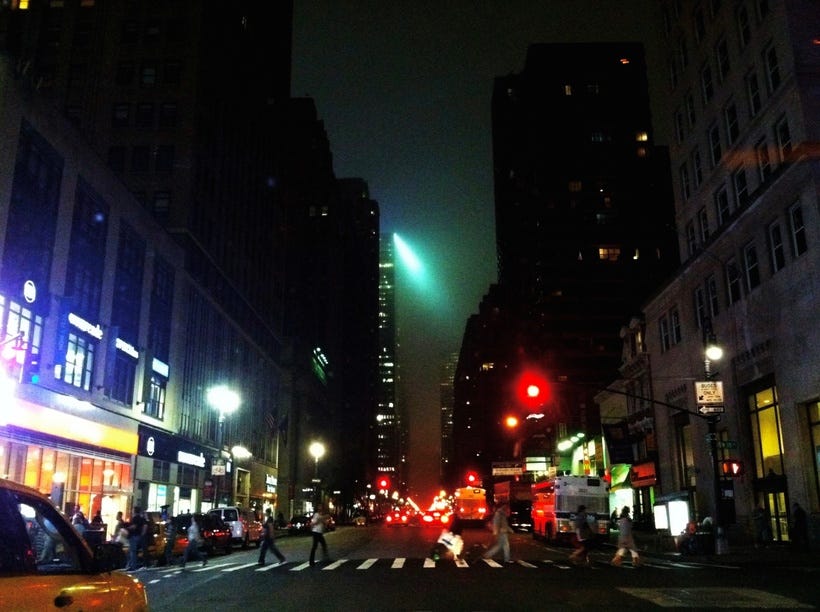Sisyphus
The following is a draft of the first chapter for Athena, the second novel in the series, The Desert Road of Night.
January 17, 1997
This was now the routine.
His life.
Day in.
Day out.
Andrés would wake up in the middle of the night to feed and soothe his crying daughter, Estefania, nicknamed Daphne. He would then stay up until she was asleep again. Instead of going back to bed, Andrés would take that opportunity, with the free time only found for parents of children in the dead of night, to sit on his couch in the family room and read until his alarm went off. He would then have to jump up and race into his bedroom to turn it off before it woke Elisa up from her sleep.
He would begin his day by getting ready, then leaving his apartment in Bushwick to walk in the cold, blue hour of the morning to the Montrose Avenue station, where he would board the train and battle other miserable commuters for a seat or a place to stand and ride it from Brooklyn into Manhattan. At the Herald Square stop, Andrés would rush out of the train and fight his way through the underground maze of the subway station to get above ground. He would keep fighting through the crowds, all teeming on the sidewalk—rushing with their faces to the pavement—avoiding eye contact, until he reached the plain glass building where he worked. Inside, he would jam his body into a small elevator and would be pressed to the wall by other commuters, their faces down, until it would be his floor. He would rush through the glass doors leading into the office, sit at his desk covered with stacks of paperwork, take a deep breath and swallow, and then tackle the pile.
In his role as a human resources assistant at a firm that managed, for its clients, their mailrooms and secretaries—a role he picked up after being fired from a temp job in December 1994—it was Andrés’s job to screen thousands of resumes, conduct background checks, and coordinate drug tests. He was also their de-facto database administrator, managing the firm’s personnel and payroll data and writing code to create on-the-fly solutions for problems that would always surprise the respective managers in the human resources and finance departments.
Day in.
Day out.
This was the rock.
His square life.
The toughest part of his job would not be the needless drama, stemming from artificial deadlines, for useless reports, generated on absurd amounts of paper, that would go on to form more stacks of paperwork, which would then sit unread on countless desks. It would be worse—it would be having to walk around the office with a forced smile, ready to belt out a forced laugh, at stories and jokes his coworkers would stop and share with him, as if they would think that just by having his desk, in proximity to them, Andrés would find their crude and hateful humor, taken from the antics of shock jocks and AM radio talk shows, funny. By the end of the workday, when Andrés would jam his body back into the elevator and leave the glass building for home, on the walk back to the Herald Square station, he could take off his mask, remove the forced smile, and express his misery with a blank, empty stare while walking with his face up towards the stars.
That Friday night was no exception—it was seven when Andrés went below ground and fought his way through the underground maze of the subway station again. Then, he waited on a crowded subway platform until the light of an approaching train became visible in the distance of the dark tunnel, with him making the choice to step back instead of jumping forward as it rushed into the station, blowing out an invisible plume of mechanical heat before opening the doors.
Andrés battled other commuters for a seat and lost.
He held onto a railing above and watched how everyone around him stared dead into space until something in them had gone ghost—checked out—with their eyes rolling back, becoming like pearls. Whatever was left in their bodies shifted with the train’s movement as it made its way underground. At Union Square, just before transferring to the L train for Brooklyn, Andrés felt what was still an instinct—to leave the station and make the walk he had made hundreds of times before, when he was twenty-three years old and broke and underemployed but in love with life—so much in love with life, and with her—to the apartment where he discovered his true self, in her Purple Room.
He repeated to himself a line of poetry by Pablo Neruda:
We, of that time, are no longer the same.
I no longer love her, that’s certain, but how I loved her.
He continued repeating it to himself, as if it were a mantra, until the L train rolled into the Montrose Avenue station and he got off. He climbed the steps and was above ground. The bitter cold hit him hard, slowing his walk. His home was blocks away. It felt like miles in the chill of what felt like the longest winter.
Andrés whispered to himself, “It is what it is.”
All for his almost three-month-old daughter, Daphne.
All for his six-year-old son, Andy.
All for his nine-year-old stepdaughter, Myra.
All for the hope he has for the future.
Up in the night, in a clearing of clouds, he saw the constellation Orion. The belt of stars. The otherness of life, of this world—beyond the mundane, and the Him, and the Her, and the Us.
Andrés could see it—the big picture. With the sky so vast and the number of stars in the night so infinite, Andrés was small. If he was small, everything else, including his problems—his challenges and loneliness, and depression—was smaller. That there was more to life than this, and that just because Andrés couldn’t see it didn’t mean it wasn’t there.
He smiled, whispering to himself, “It’s gonna be okay, I guess... Keep it moving.”
The clouds rolled through the night, covering Orion. Andrés continued his walk home, stopping at a bodega to buy milk and a brownie. As he milled about looking for more items, he noticed a short, fat man with a haircut that made his head look like an eraser on a stubby, brown pencil staring at him.
Andrés returned his stare with his own.
The man smiled as he walked over. He leaned in until they were face-to-face, placing his hand on Andrés’s shoulder, his oversized eight-ball jacket hanging from his cuffs.
“I’ve seen you around the way with Elisa,” he said. “You’re her man? Right? You don’t recognize me? She was my girl.”
Andrés looked at the man’s hand, still on his shoulder, before laughing and looking back at him. “So?”
“So?… How do you like my apartment? I got it with Elisa.”
“It’s a shitty apartment.”
“But you’re there now,” the man said, laughing and squeezing Andrés’s shoulder, pressing down hard to keep him from walking away. “Let me ask you this: Did you guys get a new bed? New furniture? Because you should—I used to fuck her on that bed, on that couch. It doesn’t matter if I don’t live there anymore; it’s still my place. She’s still my girl. I’m still her man.” He dropped his hand from Andrés’s shoulder to reach into the pocket of his oversized jeans to pull out a twenty-dollar bill, scrunched it into a ball, and flicked it into Andrés’s face. “Whatever you’re buying for my girls, that’s for that.” The man walked away.
Andrés reminded himself of the promise he had made to himself on the night he handled Caleb: no more violence. He took a deep breath and swallowed as he left the balled-up cash on the floor and went to the counter, counting his loose change and having enough to pay for his items. He left the bodega and continued his walk for several more blocks until he was in front of his apartment building. He rushed in to escape the cold, climbing a dark staircase that smelled like bleach and mold. Once on the top floor, he unlocked the door to his apartment. Inside, he found Elisa walking into the family room from the kitchen, welcoming him home with a bright smile.
“My baby, I miss you,” she said, rushing up to kiss him.
“I miss you too,” he said, kissing her back. “But where’s my other baby?”
“She’s right here.” Elisa presented Daphne, who was nestled in the comfort of her mother’s arms.
Andrés leaned in to kiss his daughter, then set the white plastic bag containing the milk on the floor next to him. Just as he was about to reach for Daphne, Elisa said, “Relax… Enjoy the last few minutes of your break—your shift starts soon.”
“I know,” he said, caressing the part of Elisa’s scalp that still had hair, trying to relieve her of any pain from her recent surgery. “How are you feeling?”
“Better than yesterday. Tomorrow will be even better.” Elisa took a deep breath and forced a smile. “Don’t worry about me. I can do this. I have to... I’m not going to miss the first few months of Daphne’s life because of the pain. I could never get that time back.”
“I know… I wish I hadn’t missed the first year of Andy’s life, recuperating…”
“That’s not going to be me,” Elisa said.
Andres pulled the bodega brownie from his coat pocket. “I have a treat for Myra. Where is she?”
“She’s in her room, doing homework. Did you get one for Olivia?”
“I didn’t have enough money.”
Elisa sighed. “That’s okay… I’ll split this in half and give it to them later. That should cheer Olivia up. She’s still sad.”
“I don’t blame her.” Andres said.
“She’s been asking when is her mother coming to get her?”
“Tell her the truth; her mom is in rehab,” Andres said, taking off his coat and placing it on a stand by the door.
“I can’t tell her that,” she said.
“I don’t understand; why is she our problem?”
“Because Olivia is our niece, and I have to help my sister. What else am I supposed to do?”
“Worry about yourself.”
“Wait a minute?” she said. “Don’t put this all on me. You’re the one who said you didn’t want Olivia going into the system. You freaked out at the thought of her being in foster care.”
Andrés took a deep breath and swallowed. “I know. Forget what I said… I’m sorry; I’m so stressed out.”
“So am I, but Olivia is here, and we’re all she’s got. And I know you’re frustrated, but you’re a good man for thinking about the bigger picture. It’s why I love you.”
“I love you, too,” he said.
“We’ll talk more about her later. I want you to sit and relax. I’m going to finish feeding Daphne.”
Elisa walked away into their bedroom, while he grabbed the white plastic bag from the floor and walked to the kitchen. He placed the milk in a near-empty refrigerator before coming back to the family room.
Andrés turned on the TV, settling into a chair in front of it. He stared dead at the screen, tuned to a music channel. Video after video played. It was all a blur until a music video, shot in a grainy black-and-white film format, came on.
Something in Andrés that had gone ghost for almost four years was now alive, awakened by the frontwoman of a grunge band, swaying her sleek body to the tempo of a heavy bassline groove. He could not see her face, and the way her hair was blown out like the head of a dandelion threw him off for a moment, but the way she moved reminded him of someone he had lost because he was stupid and didn’t know how to dance with her. When she began to talk, not sing, as though she were reading a prose poem along with the groove, Andrés laughed. He laughed even harder when she turned around to reveal her face. It was Sylvia.
“You sold out!” Andrés’s smile became wide and bright, and immense joy filled his heart. He said aloud, “Good for you! I’d sell out too, move out of this shitty neighborhood.”
Elisa came back from the bedroom, still holding Daphne, who was now awake. “Who sold out?”
“It’s nothing,” he said.
“It’s something—you woke her up.”
Andrés pointed at the TV. “That’s Sylvia.”
Elisa’s eyes became wide in surprise. “So that’s her?”
“Yeah, that’s her… You remember? All over me?”
“Barely.”
“When we met, you said you remembered who I was only because you remembered who she was—the chick who’d talk shit on stage about needing no man but would be all over me the way she was... Remember?”
“You want to rub it in my face now?”
“Are you kidding me? In your face? Every night I come home from work, I have to see that meathead, ex-boyfriend of yours standing on the corner like a fool, staring me down. I have to act like I don’t know who he is, for his sake, but today, he decided to press me—just before coming home, he came up to me in the bodega.”
Elisa’s expression went from annoyance from having seen Sylvia on TV to a mixture of surprise and anxious fear. “He did? What did he say?”
Andrés couldn’t help but smile. “Does it matter?”
“No?”
“Was he supposed to pass on a message?”
“Of course not; I’m just saying. I don’t want Gus bothering you.”
“It’s no bother; like I said, I ignore him for his sake. I’m a family man now. I don’t need to catch a case—end up in the Tombs—all because that meathead wants my attention. Trust me, he doesn’t want that.”
“Oh, he doesn’t?” Elisa asked with a skeptical smirk that betrayed her continued loyalty to her ex-boyfriend.
“You think I’m playing? Sylvia had an old friend who caught my attention way too much, and now he’s gone. Every night I ignore that chump, I’m blessing him with another day of life.”
“And what’s that supposed to mean?” Elisa said.
Andrés took a deep breath, holding himself back from saying more. He swallowed the urge to renege on the promise he had made to himself—for how Gus had placed his hand on his shoulder, for how Elisa kept calling him by her ex-boyfriend’s name as she was coming out of anesthesia—after having a small tumor removed from her frontal lobe—reminding himself once more: No more violence.
“It’s nothing,” Andres said. “You, on the other hand, can’t be reminded for more than thirty seconds that I had that badass in my life. Let me be happy for her in peace. Sylvia’s had a hard life. She needs all the fucking wins she can get. She’s the reason why I see the big picture, and your niece is here and not in the system. So I want you to look at the TV, bow, and say to her, ‘thank you.’”
For a moment, Elisa stared at Andrés. He was hypnotized by the music video. She walked over to the TV, shutting it off, then walked back over to him and shoved Daphne into his arms. “Your shift starts now—I need to shower.”
After Elisa rushed out of the family room and down a hall, through the door leading into the bathroom, Andrés stood, walked over to the TV, and turned it back on. He remained standing, watching while holding Daphne.
“Estefania,” he whispered to his daughter, using her legal name. “You see that woman on TV? Your nickname is one of Daddy’s nicknames for her. Mommy thinks she’s slick, hiding mementos and old pictures of her ex-boyfriend, but that’s okay. Daddy can never control what’s in your mommy’s heart. Your nickname is what I keep in mine. You should’ve been Sylvia’s little girl.”
Andrés looked back up at the TV and stared for a long time. Sylvia appeared to be staring back at him through the screen, with eyes that still shined brilliantly blue and dark hazel, even in the grainy black-and-white film format.
“It is what it is,” he whispered before looking back down at his daughter. “And it’s okay. Passion is overrated. I’m just so glad to be here with you.”





